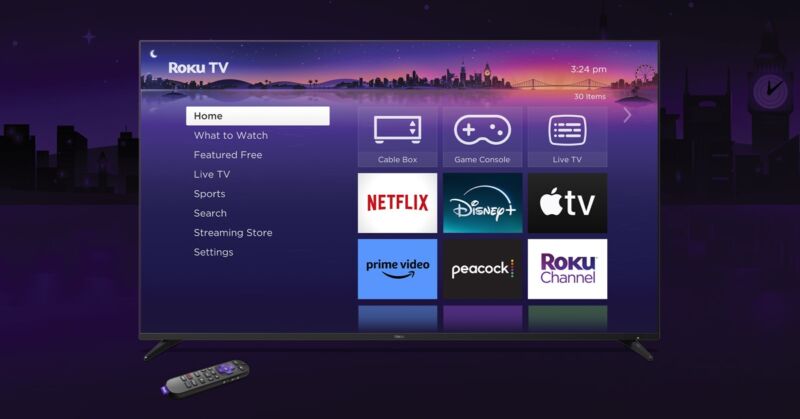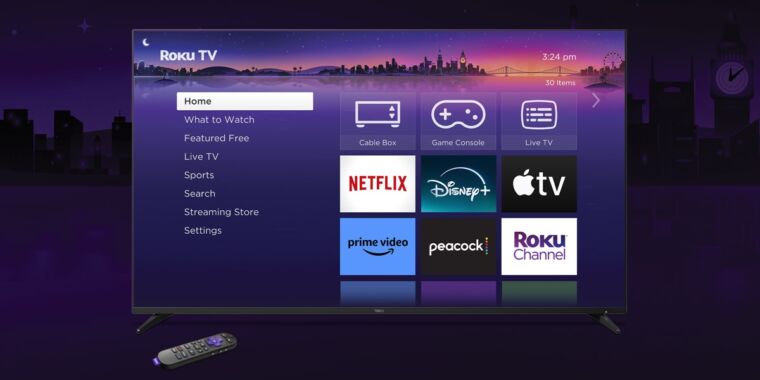
Roku
Roku CEO Anthony Wood disclosed plans to introduce video ads to the Roku OS home screen. The news highlights Roku’s growing focus on advertising and an alarming trend in the streaming industry that sees ads increasingly forced on viewers.
As spotted by The Streamable, during Roku’s Q1 2024 earnings call last week, Wood, also the company’s founder and chairman, boasted about the Roku OS home screen showing users ads “before they select an app,” avoiding the possibility that they don’t see any ads during their TV-viewing session. (The user might only use Roku to access a video streaming app for which they have an ad-free subscription.)
Wood also noted future plans to make the Roku home screen even more ad-laden:
On the home screen today, there’s the premier video app we call the marquee ad and that ad traditionally has been a static ad. We’re going to add video to that ad. So that’ll be the first video ad that we add to the home screen. That will be a big change for us.
Wood’s comments didn’t address the expected impact on the Roku user experience or whether the company thinks this might turn people off its platform. In December, Amazon made a similar move by adding autoplay video ads to the home screen of the Fire OS (which third-party TVs and Amazon-branded Fire TV sets and streaming devices use). Fire OS users who disable the ads’ autoplay function will still see ads as “a full-screen slide show of image ads,” per AFTVnews. Some users viewed the introduction as an intrusive step that went too far, and Roku may hear the same feedback.
During Roku’s earnings call, Wood also said the company is testing “other types of video ad units” and is looking for more ways to bring advertising to the Roku OS home screen.
This comes after recent efforts to expand ad presence on Roku OS, including through new FAST (free ad-supported streaming TV) channels and by putting content recommendations on the home screen for the first time, per Wood, who said the personalized content row “will be, obviously, AI-driven recommendations.”
“There’s lots of ways we’re working on enhancing the home screen to make it more valuable to viewers but also increase the monetization on the home screen,” he said.
Roku’s revenue rise
Roku saw its average revenue per user (ARPU) drop from $41.03 in Q3 of its 2023 financial year to $39.92 in Q4 2023 (in Q4 2022, the company reported an ARPU of $41.68). Last week, Roku reported that ARPU, a key metric for the streaming industry these days, rose to $40.65 in Q1 2024. Meanwhile, Roku’s active account count rose by 1.6 million users from the prior quarter to 81.6 million.
“Roku has a direct relationship with more than 81 million Streaming Households, and we are deepening relationships with third-party platforms, including [demand side platforms], retail media networks, and measurement partners. Our business remains well positioned to capture the billions of dollars in traditional TV ad budgets that will shift to streaming,” an April 25 letter to shareholders [PDF] authored by Wood and Roku CFO Dan Jedda reads.
Like many streaming companies, a shift toward ads has resulted in higher revenue potential and user discontent. In its Q1 2024 results, Roku reported that revenue for its Devices business reached $126.5 million, compared to $754.9 for its Platform business, which drives most of its revenue through ad sales, representing a 19 percent year-over-year (YoY) increase. Overall, revenue rose 19 percent YoY to $882 million, and Roku’s gross profit grew 15 percent YoY to $388 million.
But growing revenue doesn’t equate to an improved user experience. For example, an Accenture survey of 6,000 “global consumers” noted by The Streamable found that 52.2 percent of participants thought that streaming platform-recommended content “did not match their interests.” Similarly, an October TiVo survey of 4,500 viewers in the US and Canada ranked “streaming apps / home screen / carousel ads” as the fourth most popular method of content discovery, after word of mouth, commercials aired during other shows, and social media. While Roku is a budget brand associated with more affordable TVs and streaming devices, excessive ads could make people reconsider the true price of these savings.
Despite people’s ad aversion, Roku intends to find more ways to drive advertising opportunities. Among those ideas being explored is the ability to show ads over anything plugged into the TV.

